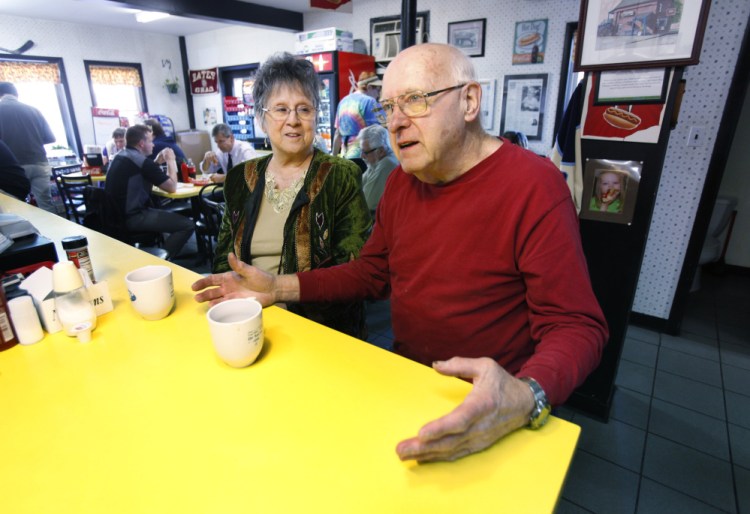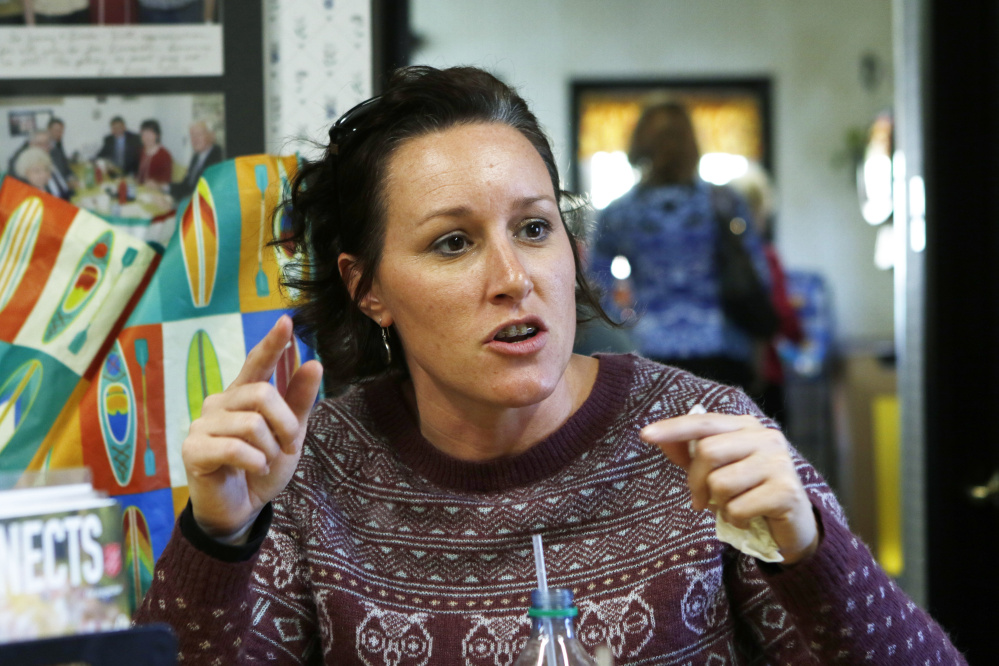LEWISTON — The city’s much-anticipated five-way mayor’s race turned out the way most expected – with incumbent Robert Macdonald moving on to face challenger Ben Chin in a special runoff election next month.
But Tuesday’s results may not necessarily portend what will happen in that runoff, scheduled for Dec. 8.
The biggest factor in the head-to-head matchup between Macdonald, the conservative outspoken two-term mayor, and Chin, the liberal community organizer who has raised and spent a record amount of money, will be turnout.
On Election Day, 8,332 voters cast votes for mayor – a moderate turnout of about 33.5 percent, according to City Clerk Kathy Montejo. Chin got 44 percent of those votes, while Macdonald received 37 percent. However, since neither received 50 percent, they will face each other again in a runoff as outlined in Lewiston’s city charter.
Assuming Chin and Macdonald retain the same level of support they had on Tuesday, the challenger would appear to have the edge.
But then there are the 1,552 residents who voted for someone else on Tuesday – in particular the 1,276 who voted for Steve Morgan, a former City Council president who appealed to a bloc of voters who believe Macdonald is too conservative and Chin too liberal. It’s not clear whether they’ll switch their votes to another candidate or just stay home.
And what about the high number of Bates College students who turned out – the overwhelming majority of whom voted for Chin, a Bates graduate? Will they come back in a month, when it’s finals week?
Chandler Ryan, a first-year student from Delmar, New York, who voted for Chin on Tuesday, said she’ll make sure she returns to the polls next month.
Ryan, who at 19 voted in her first-ever election, said she knew more about the local election in Lewiston than what was going on in her hometown. That’s why she registered to vote in Lewiston.
“But I also live here and I think what happens in government affects me,” she said.
Calvin Reedy, a junior from Wilton, Connecticut, has voted in Lewiston each of the last two elections. He voted for Chin as well and plans to do so again in a month.
“It will be an extra effort to vote again but I think people will still be motivated,” he said.
It’s impossible to tell whether more Bates College students voted this year than in the past; Montejo said it’s illegal to track those numbers. Election workers working in Ward 1, which includes Bates, did see a lot of new voter registrations. Lewiston has seven wards but four voting locations.
Tracey Levesque, who lives in Auburn but is involved in local politics on both sides of the Androscoggin River, said she has followed the mayor’s race closely. She thinks Morgan’s support, or most of it, will go to Macdonald, who will need it to overcome the 569-vote margin Chin built on Tuesday.
Gil Savoie, who voted for Macdonald, said he wouldn’t underestimate the mayor.
“I think he speaks for a lot of people and, more than that, he gets things done,” he said. “Or he tries to, at least.”
Macdonald has the power of incumbency, and could get a boost from the state Republican Party, but seemed blasé Tuesday about the outcome.
“I haven’t really campaigned. He’s the one who’s been making the campaign,” he said. “I only expected to be here for four years and I expected this would be the last (year). This is my last hurrah. If I win, I win. If I lose, I lose. No big deal.”
Chin, a longtime employee of the Maine People’s Alliance, said he will combat Macdonald’s incumbency with a robust get-out-the-vote effort. The Maine Democratic Party could also send resources his way.
On election night, he said he would have preferred the election be over so he could spend more time with his wife and newborn daughter, but also said the runoff election gives him “four more weeks to knock on doors.”
Macdonald’s supporters have tended to skew older, a reliable voting bloc for both regular and special elections.
But not all of Lewiston’s older residents have backed Macdonald.
Joan and Bert Caron, both 80, said they voted for Chin and planned to do so again.
“I wanted to see someone different, someone younger,” Bert Caron said.
There is little precedent in Lewiston that would offer clues to how the runoff will go.
Montejo said the last time the city saw a runoff election was the 2011 mayor’s race, between Macdonald and Mark Paradis. In the general election, 9,476 residents voted (nearly 40 percent turnout) but that number dropped to 5,023 for the runoff.
But that race is not a good predictor, because Paradis died between the regular and the special elections. Macdonald won the runoff by 70 votes after trailing Paradis in the general election by about 150 votes.
One variable that could affect turnout is weather. A big December snowstorm could have an impact on voters’ ability to get to the polls.
Montejo said only one polling place will be open, Longley Elementary School on Birch Street, instead of the customary four locations. That could also affect the turnout of Bates students, who typically vote at the Lewiston Armory, just a short walk from campus. The Longley school is more than a half mile away.
Voters can still cast absentee ballots for the runoff.
Send questions/comments to the editors.



